
The U.S. pressure campaign against Chinese makers of surveillance cameras has slashed sales growth for global leaders Hikvision and Dahua outside their home market.
Hikvision and Dahua have built a wealth of expertise in facial recognition technology and big data analysis, benefiting greatly from China keeping watch over its citizens.
The pair used this expertise to develop footprints in the West, as those countries combat terrorism. Mass production capabilities gave them a competitive edge on price.
Hikvision, formally known as Hangzhou Hikvision Digital Technology, enjoyed a leading 30% global share in surveillance cameras last year. Dahua stood in second place, and the two companies together control more than 40% of the worldwide market.
The two Chinese producers were well placed to capture rapidly rising global demand. The international market expanded 30% in 2018 to 57 million units, according to Yano Research Institute, a Tokyo-based data provider.
But a U.S. defense authorization bill enacted in August 2018 bars government agencies from procuring equipment from five Chinese companies. They include Hikvision, which is linked to a state-owned enterprise.
Hikvision's offshore revenue growth slowed to 16% in 2018, after rising 31% in 2017. The trend continued during the first half of 2019, as sales grew only 10% on the year.
For Dahua, or Zhejiang Dahua Technology, such growth sank from 35% all the way down to 8%.
Both companies derive around 30% of their revenue from outside China, and the U.S. is the main culprit for their slowing growth in foreign sales.
Hikvision's market share of North American deliveries dropped 3 percentage points to 9% last year, data from Tokyo-based Techno Systems Research shows, while Dahua fell 1 point to 5%. The declines came as overall deliveries across the region soared 12%.
Washington has criticized Beijing for using surveillance cameras to suppress the Muslim Uighur minority in China's northwestern Xinjiang region. The outcry over the Uighur issue has come from Europe as well.
The U.S. Commerce Department consequently also added Hikvision, Dahua and 26 other Chinese organizations to its Entity List. This blacklist essentially bans the enterprises from dealing with American companies and limits procurement of software, chips and other U.S.-derived components and technology.
Hikvision says the company strictly adheres to the national security requirements in the countries of its clients.
Japanese and South Korean rivals stand to benefit in the U.S.
Axis Communications, a Swedish subsidiary of Japanese technology group Canon, ranks third in global market share. Axis controlled 32% of the North American market in 2018, up 4 points from the previous year. Panasonic and South Korea's Hanwha Techwin also are increasing surveillance camera sales in North America.
The fortunes of Chinese-made security cameras reflect the growing split in economic activities between the West and regions under China's sphere of influence. Many components can be found within Chinese borders, so the effect of American sanctions will be limited. At the same time, the U.S. can easily look elsewhere for surveillance cameras.
China accounts for three-fourths of the global surveillance camera market, and Chinese demand jumped 33% in 2018. Hikvision and Dahua command overwhelming shares domestically, and growth is anticipated at home even if both companies are driven from the U.S.
Hikvision President Hu Yangzhong said in October that the company began preparing for U.S. sanctions last year, and that the business will suffer no impact. Procurement of semiconductors and other parts have become less dependent on U.S. suppliers, Hu said.




















